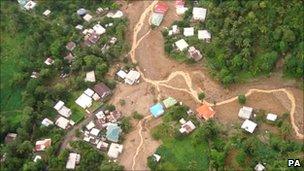St Lucia hurricane: Your stories
- Published
At least 14 people are now known to have died on the Caribbean island of St Lucia after Hurricane Tomas triggered landslides, officials say.
Bridges were destroyed, and some of the worst-hit communities in the south could only be reached by boat.
Here, residents of the island describe the damage caused by the hurricane and their efforts to get back to normality.
Tony Finisterre, Castries, St Lucia

Tony Finisterre says the mud is high in Fond St Jacques
I work with a communications company and have been working trying to reconnect the south of the island.
I've been to the region which has been badly affected by the storm - Soufrieres and Fond St Jacques.
We have been distributing manually operated electrical goods, wind-up radios, and manual chargers.
We have also supplied people with food in collaboration with local supermarkets.
The Red Cross, the French and the British armies are assisting with shelter, food, dry clothing, bedding and blankets.
Soufrieres is still only accessible by sea.
Fond St Jacques was badly hit by the storm.
Some residents who remained in their homes after the first landslide had to be forcefully evacuated and taken to the shelter at the local Catholic church.
The mud there is 12 to 20 feet high. There were some two-storey houses where only one storey is now visible.
Others were just washed away or hit by water-borne debris. There is no electricity.
Princess Blondell, Babonneau, Castries, St Lucia
I wasn't as badly affected as a few of my neighbours, who at the moment can't live in their own houses.
One of the houses split in two and the landslide pushed it down.
The other one lost its front. There were three children inside and we had to call the father to get them out.
At the moment, we can't get out of the neighbourhood because the road has been blocked by the landslides.
My husband and other men built a walk-up using concrete, but it was washed away by the rain.
I am worried about my own home because we live on a hill and some of the houses are falling down on top of mine.
If the weather gets worse, we might have to move to my mother's house, which is higher up.
We don't have any electricity as the meter was pulled away from my house and is lying on the ground. The poles will have to be removed and put back as they were in the way of the landslide.
There is no running water but I have a tank, so we have been sharing the water with neighbours, for drinking and cooking.
We are patient, and we know that people are doing everything they can to help us. Our prime minister has advised people to move, but some just don't have anywhere else to go.
- Published2 November 2010